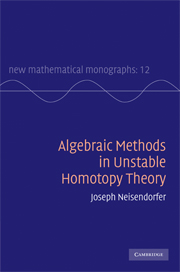Book contents
- Frontmatter
- Contents
- Preface
- Acknowledgments
- Introduction to unstable homotopy theory
- 1 Homotopy groups with coefficients
- 2 A general theory of localization
- 3 Fibre extensions of squares and the Peterson–Stein formula
- 4 Hilton–Hopf invariants and the EHP sequence
- 5 James–Hopf invariants and Toda–Hopf invariants
- 6 Samelson products
- 7 Bockstein spectral sequences
- 8 Lie algebras and universal enveloping algebras
- 9 Applications of graded Lie algebras
- 10 Differential homological algebra
- 11 Odd primary exponent theorems
- 12 Differential homological algebra of classifying spaces
- Bibliography
- Index
2 - A general theory of localization
Published online by Cambridge University Press: 03 May 2010
- Frontmatter
- Contents
- Preface
- Acknowledgments
- Introduction to unstable homotopy theory
- 1 Homotopy groups with coefficients
- 2 A general theory of localization
- 3 Fibre extensions of squares and the Peterson–Stein formula
- 4 Hilton–Hopf invariants and the EHP sequence
- 5 James–Hopf invariants and Toda–Hopf invariants
- 6 Samelson products
- 7 Bockstein spectral sequences
- 8 Lie algebras and universal enveloping algebras
- 9 Applications of graded Lie algebras
- 10 Differential homological algebra
- 11 Odd primary exponent theorems
- 12 Differential homological algebra of classifying spaces
- Bibliography
- Index
Summary
In this chapter we consider the general theory of localization which is due independently to Dror Farjoun and to A.K. Bousfield. The theory is founded on the homotopy theoretic consequences of inverting a specific map µ of spaces. Those spaces for which the mapping space dual of µ is an equivalence are called local. In turn, the local spaces define a set of maps called local equivalences. The localization of a space X is defined to be a universal local space which is locally equivalent to X.
Localizations always exist. It is a nice fact that the localizations of simply connected spaces are also simply connected. This makes it possible to restrict the theory to simply connected spaces which is what we do in this chapter.
For simply connected spaces, the Dror Farjoun–Bousfield theory specializes to the classical example of localization of spaces at a subset of primes S. The complementary set of primes is inverted. We begin by inverting the maps M → * for all Moore spaces M with one nonzero first homology group isomorphic to ℤ/qℤ where q is a prime not in S. In this case, the equivalences are maps which induce an isomorphism of homology localized at S.
Localization of spaces first occurs in the works of Daniel Quillen, of Dennis Sullivan, and of A.K. Bousfield and D.M. Kan.
- Type
- Chapter
- Information
- Algebraic Methods in Unstable Homotopy Theory , pp. 35 - 93Publisher: Cambridge University PressPrint publication year: 2010



